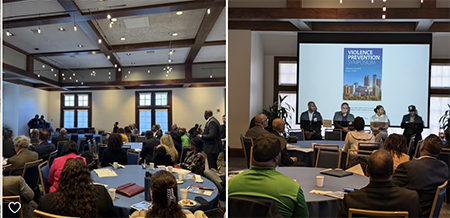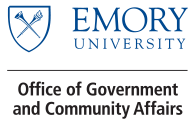| | 172nd Edition | February
28,
2025 |
| |
| State Affairs | President Fenves at the Gold Dome
On Feb. 24, President Gregory L. Fenves visited the Georgia state capitol. President Fenves was able to speak with many legislators and staff members including House Appropriations Chairman Matt Hatchett, a representative from the Lieutenant Governor’s office, representatives from the Governor’s office, and Senator Jason Esteves. Representative Mary Margaret Oliver brought President Fenves to the House floor to meet with legislators as well. President Fenves spoke about all that Emory means to our great state, as an engine for breakthrough research, medical advances, scholarship, and, of course, opportunities for talented students. We appreciate all the elected officials and their staff members for their tremendous service and commitment. |
| |
|  | | | Pictured above is President Fenves with Representative Scott Hilton and Representative Mary Margaret Oliver.
Tort Reform Update
On Feb. 21, the Georgia State Senate passed SB 68, the omnibus tort reform bill, championed by Senate President Pro Tempore John F. Kennedy (R – Macon). The legislation passed 33- 21, primarily by party line, with one Democrat voting with the majority party. The bill now moves to the House for consideration. We appreciate Governor Brian Kemp for making tort reform a priority this session.
SB 68 introduces significant reforms to Georgia’s civil liability laws, including Emory’s priorities — limiting anchoring and phantom damages. The bill also addresses trial bifurcation, attorney fee recovery, seatbelt evidence, and premises liability standards. When heard in the Senate Judiciary, a committee substitute adjusted the anchoring provision to allow parties to suggest a value for pain and suffering during closing arguments, provided it is rationally related to the evidence. The phantom damages section permitted plaintiffs with health insurance to recover premium costs under certain conditions. A floor amendment sponsored by Sens. Hatchett, Kennedy, and Strickland further modified the phantom damages provision, allowing:
- Evidence of both charged amounts and amounts necessary to satisfy medical bills under an insurance contract, even if the plaintiff declined to use their insurance.
- Evidence of a letter of protection (LOP) and related details.
- Legislative intent to abrogate the collateral source rule, addressing potential constitutional concerns.
We are grateful to all involved in drafting this legislation and ensuring that critical reforms like anchoring and truth in damages are included. The Emory state affairs team will continue to actively engage and track the legislation as it moves forward.
Emory Healthcare Veterans Program at the Capitol
On Feb. 18, Dr. Barbara Rothbaum, the director of Emory Healthcare’s Veterans Program (EHVP) joined the state affairs team at the Georgia state capitol. Dr. Rothbaum spoke with legislators about the treatment provided to veterans at EHVP and her clinical trial applying breakthrough therapies to treat post-traumatic stress disorder (PTSD) in veterans. She met with Senator Kay Kirkpatrick, Representative Ron Stephens, Senator Josh McLaurin, and Lieutenant Governor Burt Jones. Legislators are very interested in her work and continuing the partnership between the state and EHVP. |
| |
|  | | | Pictured above is Dr. Barbara Rothbaum with Lieutenant Governor Burt Jones and Senator Josh McLaurin.
Dr. Joe Sutherland Testifies at the Capitol
On Feb. 19, Dr. Joe Sutherland, the director of the Emory Center for AI Learning, attended the House Higher Education Committee meeting to educate the committee on artificial intelligence, how Emory is using it, and the potential it has for our state. The committee was impressed with Dr. Sutherland’s knowledge and expertise on this subject. The state affairs team will continue to look for opportunities to lend Emory experts to serve as resources for state legislators. |
| |
|  | | | Pictured above is Dr. Sutherland testifying in the House Higher Education Committee. |
| |
| Federal Affairs | Emory Signs Telehealth Letter
Emory joined 350 organizations in sending a letter to congressional leadership urging them to establish permanent or long-term access to telehealth. Telehealth is a bipartisan policy, as demonstrated by the broadly supported 2022 legislation which extended telehealth flexibilities through 2024. Ensuring stability for telehealth policy would provide certainty for Medicare beneficiaries, strengthen our national health care workforce by allowing a greater number of clinicians to provide telehealth services, and encourage investment in the technology tools and infrastructure to offer telehealth services.
Emory Signs Research!America’s NIH Funding Letter
This week, Emory joined 600 organizations and 3,511 private citizens from across the U.S. in sending a letter to House and Senate Appropriations leadership urging support of NIH funding. NIH funding is a key supporter of medical breakthroughs, economic growth, and job creation. This funding allows the United States to remain globally competitive. The letter also urges leadership to protect our research ecosystems by preventing cuts to our indirect cost rates. Read Research!America’s letter, here.
Congress Passes Budget
Over the past two weeks, the U.S. House and Senate have both passed their individual budgets for FY26. This is the first step in the reconciliation process to extend the 2017 tax cuts. The House and Senate budgets are different, and these differences must be combined into one single budget before they move forward. With a number of changes possibly impacting Emory University and Emory Healthcare, the OGCA federal affairs team is working closely with our congressional delegation to educate and inform about the harmful impacts of some of these mandatory savings.
Update on NIH Indirect Costs Court Case
On Feb. 21, the U.S. District Court for the District of Massachusetts held a hearing on the three lawsuits challenging the National Institutes of Health’s imposition of a 15% cap on facilities and administrative (F&A) cost reimbursements for universities that conduct NIH-supported research. At the end of the hearing, U.S. District Judge Angel Kelley extended the existing temporary restraining order until she decides whether to impose a preliminary injunction.
The three suits have been filed separately by AAU, APLU, ACE, 12 member universities, and one university system; the Association of American Medical Colleges; and a group of 22 state attorneys general. The judge could issue a ruling on an injunction any day.
While the courts are deciding this ruling, the OGCA federal affairs team is working to educate and advocate for the F&A process. Please feel free to share this video with your colleagues across campus to help explain the importance of indirect funding. |
| |
| Community Affairs | Violence Prevention Symposium
On Feb. 26, the Satcher Health Leadership Institute at Morehouse School of Medicine and 100 Black Men of Atlanta, Inc., in partnership with Emory and The King Center, hosted the Second Annual Violence Prevention Symposium at Emory’s Miller-Ward Alumni House. The event brought together experts, community leaders, and public health professionals to discuss data-driven strategies for reducing violence and fostering safer communities. Participants explored violence as a public health crisis, innovative prevention strategies, and actionable solutions to drive meaningful change. We appreciate all our internal partners for helping to make this event a success. |
| |
|








